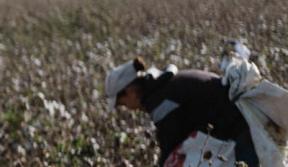Listen to ILRFs Bama Athreya's radio interview with BBC
Cotton and white t-shirt
Cotton and white t-shirt
This two-part BBC World Service series brings you an exploration of the cost and value of two commodities - coffee and cotton - via workers' stories at each stage of production.
By mapping the journeys of goods from the farm to the shop floor in two vivid soundscapes of trade, it captures the real cost of cheap crops.
Part One: Cotton
The cheap white t-shirt is a staple in many people's wardrobes, but what is the real cost of this bargain?
To find out, the programme tracked the increase in price of a kilogram of cotton as it is made into a t-shirt. On the way we are guided by industry experts, including economist Pietra Rivoli author of The Travels of a T-Shirt in the Global Economy.
The journey begins in Burkina Faso, where times are tough as the global overproduction of raw cotton has taken the bottom out of the market.
One farmer, Simon Raphael, glumly confesses that he would give up but can't, as cotton is the only cash crop in the area.
"We don't have that option", he says; "we're obliged to grow cotton even though we don't make much money from it... those who are well off and have money in the bank can be counted on the fingers of one hand."
From Africa, the cotton is bound for the economic powerhouse that is China, where workers are eager to take part in their country's new-found industrial might.
However, this can mean leaving children at home in rural districts like Anhui, as they work long hours and live on-site at one of China's thousands of garment factories.
The shelf-life of a worker is not long either, with seamstresses retiring in their early 30s because of failing eyesight.
Finally, the t-shirt arrives in New York, where shoppers search for bargains and many get them. With offers like "two t-shirts for $10", few can resist.
But as shoppers consume ever larger amounts of clothing, are they really taking into account the cost paid by workers back down the production chain?
Series Producer: Cordelia Rayner
